(word完整版)小学英语人教精通版六年级下册重点归纳,推荐文档
新人教版小学英语六年级下册各单元重点考点总结
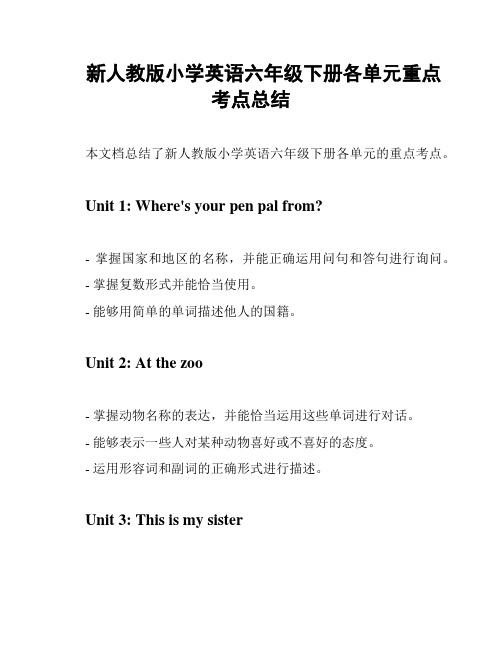
新人教版小学英语六年级下册各单元重点考点总结本文档总结了新人教版小学英语六年级下册各单元的重点考点。
Unit 1: Where's your pen pal from?- 掌握国家和地区的名称,并能正确运用问句和答句进行询问。
- 掌握复数形式并能恰当使用。
- 能够用简单的单词描述他人的国籍。
Unit 2: At the zoo- 掌握动物名称的表达,并能恰当运用这些单词进行对话。
- 能够表示一些人对某种动物喜好或不喜好的态度。
- 运用形容词和副词的正确形式进行描述。
Unit 3: This is my sister- 掌握表示家庭成员关系的词汇,并能在合适的情境下熟练使用。
- 能够用简单的句子表达自己和他人的家庭成员状况。
- 掌握疑问句和肯定/否定回答的语法结构。
Unit 4:What do you usually do on weekend?- 掌握表示日常活动和娱乐爱好的名词和动词,并能在合适的情境下熟练使用。
- 能够描述周末的计划,并能够用适当的时态表达过去、现在和未来的时间。
- 学会以礼貌的方式询问和回答他人的问题。
Unit 5: What's the matter?- 能够描述自己的身体不适,并能运用一些常用的疾病词汇。
- 掌握表示询问、建议和回答的用语,并能在合适的情境下使用。
- 学会表示关心和病愈等祝福的表达方式。
Unit 6: It's raining- 学会用简单的句子描述天气情况,并能表达对不同天气的态度。
- 掌握天气形容词的表达方式。
- 能够描述不同季节的气温、天气和风景。
总之,在学习小学英语六年级下册的过程中,应注重关注以上重点考点,并在实际中多进行运用练习,以此提高英语水平。
人教版六年级英语下册基础知识要点
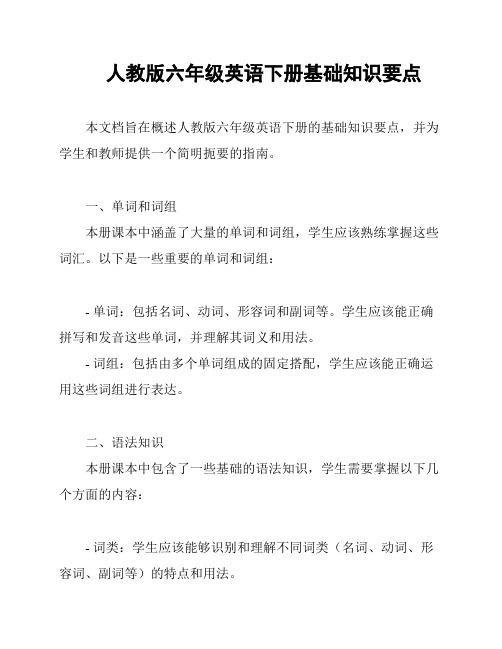
人教版六年级英语下册基础知识要点本文档旨在概述人教版六年级英语下册的基础知识要点,并为学生和教师提供一个简明扼要的指南。
一、单词和词组本册课本中涵盖了大量的单词和词组,学生应该熟练掌握这些词汇。
以下是一些重要的单词和词组:- 单词:包括名词、动词、形容词和副词等。
学生应该能正确拼写和发音这些单词,并理解其词义和用法。
- 词组:包括由多个单词组成的固定搭配,学生应该能正确运用这些词组进行表达。
二、语法知识本册课本中包含了一些基础的语法知识,学生需要掌握以下几个方面的内容:- 词类:学生应该能够识别和理解不同词类(名词、动词、形容词、副词等)的特点和用法。
- 句型:学生应该能够理解和运用一些基础的句型结构,如主语+谓语、主语+谓语+宾语等。
三、听力和口语听力和口语是语言研究中重要的方面。
学生需要通过听力练和口语训练来提高自己的听力和口语能力。
以下是一些学生可以进行的活动:- 听力练:学生可以听录音材料,理解其中的对话和内容,并进行相关练。
- 口语对话:学生可以通过与同学或教师进行对话,提高自己的口语表达能力。
四、阅读和写作阅读和写作是研究英语的重要环节。
学生需要通过阅读文章和写作练来提高自己的阅读和写作水平。
以下是一些建议:- 阅读文章:学生可以选择适合自己水平的英语文章进行阅读,了解文章的内容和结构,并进行相关阅读理解练。
- 写作练:学生可以通过写作练来提高自己的写作能力,如写日记、作文等。
五、其他要点除了以上内容外,学生还应该注意以下几个要点:- 研究方法:学生应该根据自身情况选择适合自己的研究方法,如多听多说、多读多写等。
- 复和总结:学生应该及时复所学内容,并进行总结和归纳,以便更好地掌握知识。
总结:本文档概述了人教版六年级英语下册的基础知识要点,包括单词和词组、语法知识、听力和口语、阅读和写作等。
学生和教师可以根据这些要点进行相关学习和教学活动,以提高学生的英语水平。
人教版精通英语六年级下册单元重点

人教版精通英语六年级下册单元重点Here is the English essay based on the given title, with the text length exceeding 600 words:Mastering the Key Units in the 6th Grade English TextbookProficiency in the English language is a crucial skill in today's globalized world. As students progress through their academic journey, the need to excel in this international language becomes increasingly evident. The 6th grade English textbook, published by the People's Education Press, presents a comprehensive curriculum designed to guide students towards mastering the language. In this essay, we will delve into the key units covered in this textbook and explore the significance of mastering the content within these units.The first unit, "Friendship," lays the foundation for understanding the nuances of interpersonal relationships. Through engaging stories and dialogues, students learn to navigate the complexities of forming and maintaining meaningful friendships. They explore the qualities that define true friendship, such as mutual understanding, trust, and loyalty. By exploring these themes, students develop empathy, communication skills, and the ability to build lastingconnections with their peers.The second unit, "Travel and Adventure," opens up a world of new experiences and perspectives. Students are introduced to various cultures, customs, and modes of transportation through captivating narratives and informative texts. This unit encourages students to cultivate a curious and open-minded attitude towards the world around them. By understanding the diversity of travel experiences, students can broaden their horizons and develop a greater appreciation for the richness of global cultures.The third unit, "Science and Technology," delves into the fascinating realm of scientific discoveries and technological advancements. Students are exposed to cutting-edge innovations, scientific principles, and the role of technology in shaping our modern world. This unit not only enhances their knowledge but also nurtures critical thinking skills as they analyze the impact of science and technology on our daily lives.The fourth unit, "The Environment," addresses the pressing environmental challenges facing our planet. Students engage with thought-provoking discussions on topics such as climate change, renewable energy, and sustainable practices. This unit empowers students to develop a deeper understanding of environmental issues and fosters a sense of responsibility towards the stewardship of ournatural resources.The fifth unit, "Health and Fitness," emphasizes the importance of maintaining a healthy lifestyle. Through informative texts and interactive activities, students learn about the benefits of physical exercise, proper nutrition, and mental well-being. This unit equips students with the knowledge and skills to make informed choices regarding their health, ultimately contributing to their overall physical and emotional well-being.The final unit, "Hobbies and Leisure," celebrates the joy of personal interests and the pursuit of leisure activities. Students explore a wide range of hobbies, from sports and music to arts and crafts. This unit encourages students to discover their passions, develop their talents, and find balance in their lives, ultimately contributing to their personal growth and fulfillment.Mastering the key units in the 6th grade English textbook is a crucial step in the journey towards becoming a proficient English language learner. Each unit offers a unique opportunity for students to expand their vocabulary, enhance their comprehension skills, and develop their written and oral communication abilities. By fully engaging with the content and actively participating in the learning process, students can build a strong foundation for their future endeavors in the English language.Moreover, the skills and knowledge acquired through these units extend far beyond the classroom. The ability to communicate effectively in English, understand diverse cultural perspectives, and approach problem-solving with critical thinking, are invaluable assets in the modern world. As students progress through their academic and professional lives, the lessons learned from these key units will serve as a solid foundation for their personal and professional growth.In conclusion, the 6th grade English textbook published by the People's Education Press presents a comprehensive curriculum that covers a diverse range of topics, each with its own significance in the development of well-rounded English language proficiency. By mastering the content within these key units, students will not only excel academically but also cultivate the skills and mindset necessary to navigate the challenges and opportunities of the 21st century. The journey towards English language mastery is a rewarding one, and the 6th grade textbook serves as a crucial stepping stone in this transformative process.。
[全]人教精通版六年级英语下册朗读+知识点总结
![[全]人教精通版六年级英语下册朗读+知识点总结](https://img.taocdn.com/s3/m/acd2aef93169a4517623a365.png)
人教精通版六年级英语下册朗读+知识点总结全册单词表1Unit 1go to the beach 去沙滩enjoy sunbathing 享受日光浴enjoy the moon and stars 看月亮和星星stay at home 待在家里have a party 聚会enjoy Spring Festival 过春节By plane 乘飞机sun 太阳moon 月亮star星星at night 在晚上at home 在家里listen to English 听英语speak English 讲英语read English 读英语write English 写英语talk in English 用英语交谈play in English 用英语玩游戏learn 学;学习;学到a lot of 很多word 单词;词blackboard 黑板say 说do tasks 做任务have an English party 举办英语聚会act in drama 表演戏剧learn from each other 互相学习subject 学科lesson 课but 但是yesterday 昨天why 为什么use 用2Unit 2bank 银行in front of 在......前面bookshop 书店behind 在......后面hotel 宾馆clothes shop 服装店supermarket 超市across the road 在马路对面hospital 医院river 河流near 在......附近beside 在......旁边between 在......中间healthy (food)健康的(事物)vegetable 蔬菜go down this street 顺着这条街走turn right at the traffic lights 交通灯处右转cross the street 穿过马路street 大街,街道turn right/left 右转/左转on the right/left 在右边/左边minute 分钟,一会儿City Library 城市图书馆restaurant 饭店post office 邮局by bike 骑自行车by subway 乘地铁on foot 步行half an hour 半小时city 城市library 图书馆3Unit 3America 美国Shanghai 上海Xi\\\\\\\\'an 西安Dalian 大连by plane 乘飞机by train 乘火车by ship 乘轮船travel 旅行know 知道hear 听见lake 湖;湖泊the Ming Tombs 明十三陵the Temple of Heaven 天坛the Forbidden City 紫禁城Beihai Park 北海公园tomorrow 明天visit 参观the Great Wall 长城them 他们;她们;它们(they的宾格)Britain 英国Tower Bridge 伦敦塔桥Big Ben 大本钟Niagara Falls 尼亚加拉瀑布Canada 加拿大CN Tower 加拿大国家电视塔Austrialia 澳大利亚Sydney Opera House 悉尼歌剧院Disneyland 迪士尼乐园want 想see看见favourite 最喜欢的place 位置;地点知识点总结Unit 1 I went to Sanya for my holidays.【词汇】go to the beach 去沙滩enjoy sunbathing 享受日光浴enjoy the moon and stars 看月亮和星星stay at home 待在家里have a party 聚会enjoy Spring Festival 过春节by plane 乘飞机sun 太阳moon 月亮star 星星at night 在晚上at home 在家里listen to English 听英语speak English 讲英语read English 读英语write English 写英语talk in English 用英语交谈play in English 用英语玩游戏learn 学;学习;学到a lot of很多word 单词;词blackboard 黑板say 说do tasks 做任务have an English party 举办英语聚会act in drama 表演戏剧learn from each other 互相学习subject 学科lesson 课but 但是yesterday 昨天why 为什么use 用【句型】1. —What did you do during your holidays? 你假期都做了什么?—I went to Sanya with my parents. 我和父母一起去三亚了。
人教精通版本六下第三单元复习学习知识点总结.doc
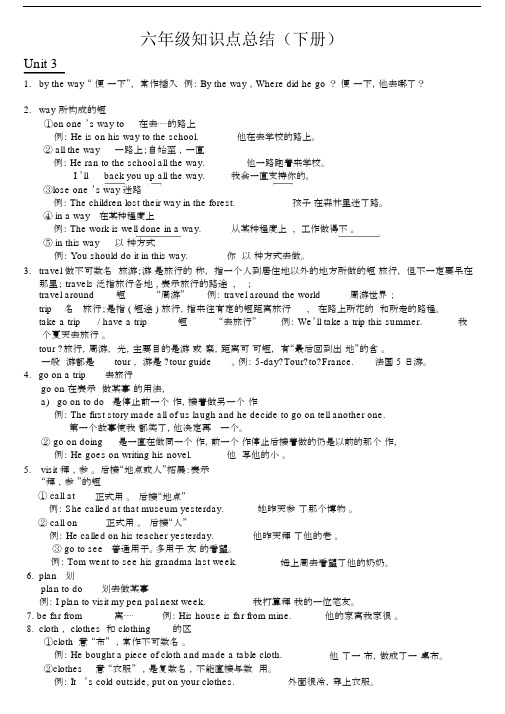
六年级知识点总结(下册)Unit 31.by the way “ 便一下”,常作插入例: By the way ,Where did he go ?便一下,他去哪了?2.way 所构成的短①on one ’s way to在去⋯⋯的路上例: He is on his way to the school.他在去学校的路上。
② all the way一路上;自始至,一直例: He ran to the school all the way.他一路跑着来学校。
I ’ll back you up all the way.我会一直支持你的。
③lose one ’s way 迷路例: The children lost their way in the forest.孩子在森林里迷了路。
④ in a way在某种程度上例: The work is well done in a way.从某种程度上,工作做得不。
⑤ in this way以种方式例: You should do it in this way.你以种方式去做。
3.travel 做不可数名旅游;游是旅行的称,指一个人到居住地以外的地方所做的短旅行,但不一定要呆在那里; travels 泛指旅行各地 , 表示旅行的路途 , ;travel around短“周游”例:travel around the world周游世界;trip 名旅行;是指 ( 短途 ) 旅行,指来往有定的短距离旅行, 在路上所花的和所走的路程。
take a trip/ have a trip短“去旅行”例:We’ll take a trip this summer.我个夏天去旅行。
tour ?旅行,周游,光,主要目的是游或察,距离可可短,有“最后回到出地”的含。
一般游都是tour ,游是 ?tour guide。
例:5-day?Tour?to?France.法国5日游。
4. go on a trip去旅行go on 在表示做某事的用法,a)go on to do 是停止前一个作,接着做另一个作例: The first story made all of us laugh and he decide to go on tell another one.第一个故事使我都笑了,他决定再一个。
人教精通版六年级英语下册各单元知识点汇总
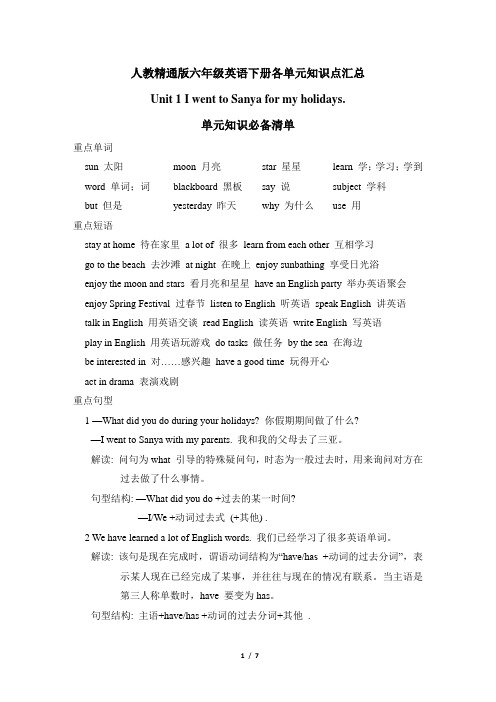
人教精通版六年级英语下册各单元知识点汇总Unit 1 I went to Sanya for my holidays.单元知识必备清单重点单词sun 太阳moon 月亮star 星星learn 学;学习;学到word 单词;词blackboard 黑板say 说subject 学科but 但是yesterday 昨天why 为什么use 用重点短语stay at home 待在家里a lot of 很多learn from each other 互相学习go to the beach 去沙滩at night 在晚上enjoy sunbathing 享受日光浴enjoy the moon and stars 看月亮和星星have an English party 举办英语聚会enjoy Spring Festival 过春节listen to English 听英语speak English 讲英语talk in English 用英语交谈read English 读英语write English 写英语play in English 用英语玩游戏do tasks 做任务by the sea 在海边be interested in 对……感兴趣have a good time 玩得开心act in drama 表演戏剧重点句型1 —What did you do during your holidays? 你假期期间做了什么?—I went to Sanya with my parents. 我和我的父母去了三亚。
解读: 问句为what 引导的特殊疑问句,时态为一般过去时,用来询问对方在过去做了什么事情。
句型结构: —What did you do +过去的某一时间?—I/We +动词过去式(+其他) .2 We have learned a lot of English words. 我们已经学习了很多英语单词。
(完整word版)小学英语人教精通版六年级下册重点归纳,推荐文档
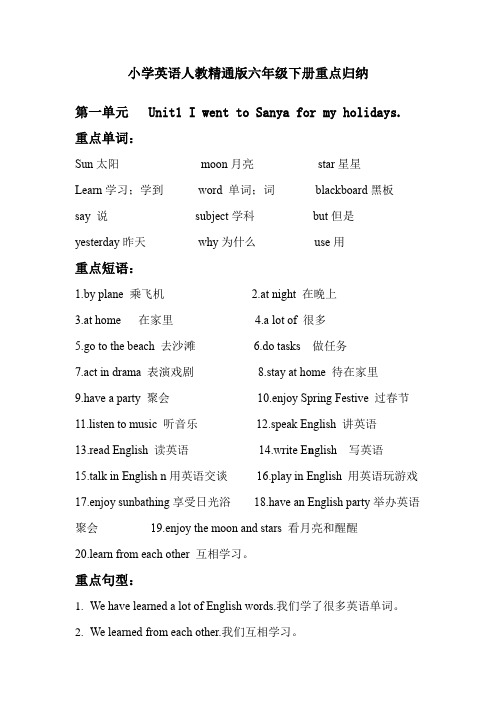
小学英语人教精通版六年级下册重点归纳第一单元 Unit1 I went to Sanya for my holidays. 重点单词:Sun太阳moon月亮star星星Learn学习;学到word 单词;词blackboard黑板say 说subject学科but但是yesterday昨天why为什么use用重点短语:1.by plane 乘飞机2.at night 在晚上3.at home 在家里4.a lot of 很多5.go to the beach 去沙滩6.do tasks 做任务7.act in drama 表演戏剧8.stay at home 待在家里9.have a party 聚会10.enjoy Spring Festive 过春节11.listen to music 听音乐12.speak English 讲英语13.read English 读英语14.write E n glish 写英语15.talk in English n用英语交谈16.play in English 用英语玩游戏17.enjoy sunbathing享受日光浴18.have an English party举办英语聚会19.enjoy the moon and stars 看月亮和醒醒20.learn from each other 互相学习。
重点句型:1.We have learned a lot of English words.我们学了很多英语单词。
2.We learned from each other.我们互相学习。
3.What did you do for your holidays?你假期做了什么?4.I went to Sanya.我去了三亚。
5.We are very interested in English.我们对英语很感兴趣。
6.How did you learn English?你(们)是怎么学英语的?7.We learned English by doing things.我们通过做事情来学英语。
六下英语知识点归纳精通版
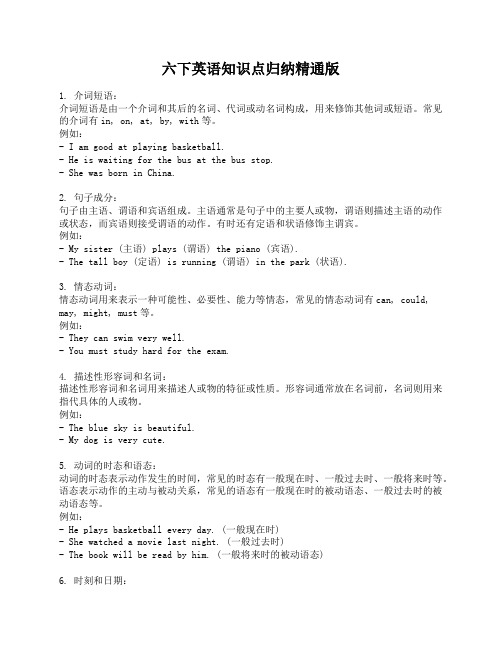
六下英语知识点归纳精通版1. 介词短语:介词短语是由一个介词和其后的名词、代词或动名词构成,用来修饰其他词或短语。
常见的介词有in, on, at, by, with等。
例如:- I am good at playing basketball.- He is waiting for the bus at the bus stop.- She was born in China.2. 句子成分:句子由主语、谓语和宾语组成。
主语通常是句子中的主要人或物,谓语则描述主语的动作或状态,而宾语则接受谓语的动作。
有时还有定语和状语修饰主谓宾。
例如:- My sister (主语) plays (谓语) the piano (宾语).- The tall boy (定语) is running (谓语) in the park (状语).3. 情态动词:情态动词用来表示一种可能性、必要性、能力等情态,常见的情态动词有can, could, may, might, must等。
例如:- They can swim very well.- You must study hard for the exam.4. 描述性形容词和名词:描述性形容词和名词用来描述人或物的特征或性质。
形容词通常放在名词前,名词则用来指代具体的人或物。
例如:- The blue sky is beautiful.- My dog is very cute.5. 动词的时态和语态:动词的时态表示动作发生的时间,常见的时态有一般现在时、一般过去时、一般将来时等。
语态表示动作的主动与被动关系,常见的语态有一般现在时的被动语态、一般过去时的被动语态等。
例如:- He plays basketball every day. (一般现在时)- She watched a movie last night. (一般过去时)- The book will be read by him. (一般将来时的被动语态)6. 时刻和日期:表达时间和日期时,需要使用特定的词汇和结构。
- 1、下载文档前请自行甄别文档内容的完整性,平台不提供额外的编辑、内容补充、找答案等附加服务。
- 2、"仅部分预览"的文档,不可在线预览部分如存在完整性等问题,可反馈申请退款(可完整预览的文档不适用该条件!)。
- 3、如文档侵犯您的权益,请联系客服反馈,我们会尽快为您处理(人工客服工作时间:9:00-18:30)。
②by多用于表达靠近物 例:Thereisatreebytheriver. 河边有棵树。
③near表达的距离通常比beside和by要远些例:
There is a river near my house. 在我家附近有条河。
重点句型:
1.WehavelearnedalotofEnglishwords.我们学了很多英语单词。
2.Welearned fromeachother.我们互相学习。
3.Whatdid you do for your holidays?你假期做了什么?
4.IwenttoSanya.我去了三亚。
5.Weareveryinterested inEnglish.我们对英语很感兴趣。
1.by plane乘飞机2.at night在晚上
3.at home在家里4.alotof很多
5.gotothebeach去沙滩6.dotasks做任务
7.actindrama表演戏剧8.stay athome待在家里
9.have a party聚会10.enjoySpringFestive过春节11.listentomusic听音乐12.speakEnglish讲英语13.readEnglish读英语14.write English写英语
6.bysubway乘地铁8.on foot步行
7.by bike骑自行车10.post office邮局
10.acrosstheroad在马路对面12.CityLibrary城市图书馆
11.halfanhour半小时14.healthy food健康图书馆
15.turnright atthetrafficlights交通灯处右转
15.①gethome到家注:getto为“到……”后接home,here,there 等地点副词时省略 to
②go home 回家 注:同样 home 为副词省略 to
16.bytheway “顺便问一下”, 常作插入语 例:Bytheway,Where did he go?顺便问一下,他去哪了?
5.Where is the bookshop?书店在哪里?6.Go down the street.沿着这条街走。
7.The bookshop is on the left.书店就在左边。
第三单元:
重点单词:
travel旅行
know知道
hear听见
lake湖;湖泊
tomorrow明天
visit参观
12.巧记地点名词前介词的用法:
里面、上面in和on,over,under上下方,infrontof前,behind后,at是在某点上。来自from,朝前to,里面穿过是through,表面穿过across,到上面onto进into。在旁边beside,附近near。
13. from…to…从……到……
小学英语人教精通版六年级下册重点归纳
第一单元Unit1IwenttoSanyaformyholidays.
重点单词:
Sun太阳
moon月亮
star星 星
Learn学习;学到
word单词;词
blackboard黑板
say说
subject学科
but但是
yesterday昨天
重点短语:
why为什么
use用
5.theForbiddenCity紫荆城6.Big Ben大本钟
7.TowerBridge伦敦塔桥8.NiagaraFalls尼亚加拉瀑布9.theCNTower加拿大国家电视塔10.TheGreatWall长城11.theSydneyOperaHouse悉尼歌剧院
重点句型:
1.WhenarewegoingtovisittheSummerPalace?我们什么时候去参观颐和园?
16.go downthisstreet顺着这条街走
重点句型:
1.There is a park in front of my home.在我家前面有一个公园。2.How can I get to the City Library?我怎样能到达城市图书馆?
3,You can get there by the NO.6bus.你可以乘坐六路公交车到达那里。4.There is a park near my home.在我家附近有一个公园。
itself它自己ourselves我们自己yourselves你们自己
themselves 他们自己
5.start和begin的辨析(意为:开始)
在口语中,start用得较多。如表示开始某一动作,后面可接不定式,也可接动名词,无实质性差别。例:Thechildbegan/started to cry. The child began/started crying.这孩子开始哭了。
7.I want to see all my favourite places.我想看看我最喜欢的地方。
语法点归纳:
一.公式化句型
1.表达某人某段时间做了什么
(问句)What did sb do+过去时间(回答)主语+过去式+其他
1.表达“对…感兴趣”的句型
主语+be interested in +名词/代词宾格/动词-ing+其它
义词 behind
②inthefrontof 在物体内部的前面 例:Thereisadesk in the front of the classroom. 在教室的前部有一张书桌。反义词 behind 或 at the back of
8.next to 靠近,几乎
例: She sat next to her mother. 她坐在她妈妈的旁边。
6.Howdid you learnEnglish?你(们)是怎么学英语的?
7.Welearned Englishby doingthings.我们通过做事情来学英语。
第二单元
重点单词:
bookshop书店
supermarket超市
behind在……后面
river河流
near在……附近
beside在……旁边
2.询问某人怎样学习某种语言
(问句)How did+主语+learn+语言
(回答)主语+learned+语言+by+动词-ing 形式+其他
3.表达像某人学习的句型
主语+learn 的适当形式+from+某人
4.描述某处有某人或某物的句型
There is/are+某人或某物+某处
5.问路的句型及其答语
for 只表示动作的持续,表示持续多长时间
例 :I was ill for a week and during the week Ididn’t
go to work.我病了一周,在这期间没去工作。
2.by + 交通工具, 表示 “乘坐……”
例 :by bike,by car,by bus,by train,by subway,by plane / air , by ship /sea 等,但“步行”为 on foot
15.talkinEnglishn用英语交谈16.playinEnglish用英语玩游戏17.enjoy sunbathing享受日光浴18.have an English party举办英语聚 会19.enjoy the moon and stars看 月 亮 和 醒 醒
20.learn from each other互相学习。
①表示时间 例:I have classes from 9:00 11:30. 我从 9
点到 11:30 上课。
②表示地点 例:They flew from Beijing to Shanghai. 他们从北京飞到上海。
14.beside,by,near的用法(都有“在……旁边”的意思,也可互相换用)
ear.她每年在伦敦住段时间。
6.interesting有趣的 例:Thisstoryisinteresting.这个故事真有趣。
be interested in + 名词/doing sth 例:He is interested in music. 他对音乐感兴趣。
7.①infrontof在物体外部的前面 例:Therearesometreesinfrontofthebuilding. 在这个楼前有一些树。 反
2.Tomorrowmorning.明天早上。
3.WouldyouliketogotoDisneyland?你想去迪士尼乐园吗?4.Yes,ofcourse.是的,当然。
5.We’regoing toHangzhoubyplane.我们将乘飞机去杭州。
6.WearegoingtovisittheGreatWallthismorning.今天早上我们要去参观长城。
② across 是副词,指从一个平面的一端到另一端,如:海的一端到另一端,across the ocean,
③through是副词,强调在三维立体的内部穿过.还有抽象的意义,如度过了某段时间等。
如:through the tunnel 穿过隧道
10.问路的几个表达方法
①How can I get to the + 你想去的地点
②Where is the + 你想去的地点
③Can you tell me the way to the+ 你想去的地点
11.巧记时间名词前的介词的用法
年月周前要用in,日子前面却不行。遇到几号要用on,上午下午又是in。要说某日上下午,用on换in才能行。正午夜晚用at,黎明用它也不错。at也在钟点前,说“差”用to,past表示“过”。
